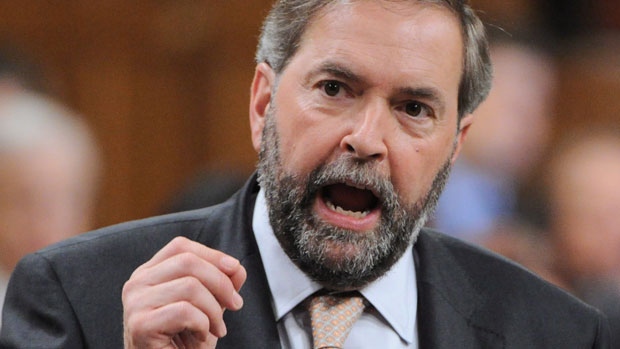The chattering classes are puzzled. They can’t figure out what is happening in federal politics these days.
(Perhaps I should explain. The term “chattering classes” was coined by the late Auberon Waugh, the acidic British writer with a talent for vituperation, and is applied, usually with a sneer, to that universe of pundits, commentators, political operatives and academics who venture to express views — from the left or right (it doesn’t matter which) — on matters of political import.)
The chatterers are not used to being confused. They see NDP leader Thomas Mulcair performing brilliantly in the Commons on the Senate expenses scandal; he makes Prime Minister Stephen Harper look like a schoolboy caught stealing nickels from the church collection plate. They think Mulcair and his party should be reaping a reward in the polls. But, no. NDP support, while solid, seems stuck, a few points below their 2011 election level.
Instead, the reward is going to the Liberals, who have not earned it. The performance of their new leader, Justin Trudeau, has been unsteady at best. Yet the Liberals enjoy a lead of six to ten points in some polls, enough to elect a minority government in 2015. It’s as though voters who want to get rid of the Harper Conservatives have concluded that the Liberals, although in third place in Parliament, offer the best chance of achieving that goal.
That the Conservatives are in deep doo-doo is a virtual given in the chattering class. A rising chorus of pundits, some of them normally of conservative ilk, is calling on the prime minister to resign before he drives his party off the cliff — and while he can still rescue his legacy.
Harper is likely to ignore that advice, whether it come from pundits or his own caucus. He’s pretty good at ignoring advice he doesn’t want to hear.
He’s been getting a lot of free advice in the wake of last week’s federal byelections. There were four of them and, when you get right down to it, nothing really happened. The Conservatives went in with two seats, both in Manitoba, and they came out with the same two. The Liberals held their two seats and the NDP was shut out. Yes, the Tories’ popular vote declined in all four ridings, but that is scarcely unusual in mid-term byelections.
The four byelections did not qualify as harbingers of change, although some byelections do. The NDP victory in the 2012 Kitchener-Waterloo provincial byelection effectively ended the regime of then premier Dalton McGuinty, just as John Tory’s loss in a 2009 byelection in Haliburton-Kawartha Lakes-Brock ended his leadership of the Ontario Progressive Conservatives. Back in 1989, there was a federal by-election in Beaver River in Alberta that was won by Deborah Grey. Her victory heralded the arrival of the Reform party on Parliament Hill.
In the harbinger game, it is hard to beat October 16, 1978. The Pierre Trudeau Liberal government was in trouble. It had to call no fewer than 15 federal byelections. On October 16, the opposition Progressive Conservatives won ten of the seats, six of them from the Liberals, who managed to retain only two seats (both in Quebec). Seven months later, the Liberals were ousted, and Joe Clark was prime minister.
We are not likely to get any harbingers on that scale before the next election. I don’t look for any dramatic breakthroughs. Federal politics has become a game for grinders not Gretzkys. Partly on the basis of polls on the Senate scandal, my sense is that people are psychologically ready to move on from the Harper era. Whether it will be to Trudeau or Mulcair remains to be seen.
Or they may not move at all. The economy remains Harper’s ace in the hole. His Tories also have more money and a stronger organization than their opponents. They will make Harper a formidable campaigner once again. Assuming, of course, he ignores the chatter and decides to hang around.
This column appeared in the Waterloo Record and Guelph Mercury.



